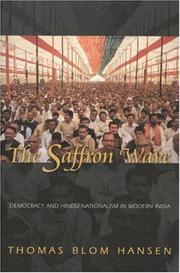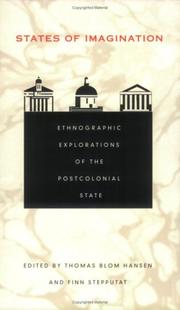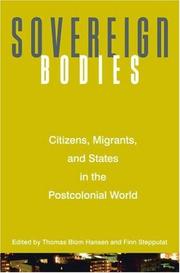| Listing 1 - 10 of 14 | << page >> |
Sort by
|

ISBN: 0691006709 0691006717 1282457853 1400823056 9786612457852 1400811988 9781400823055 9781282457850 1400803411 9780691006703 9780691006710 Year: 1999 Publisher: Princeton, NJ
Abstract | Keywords | Export | Availability | Bookmark
 Loading...
Loading...Choose an application
- Reference Manager
- EndNote
- RefWorks (Direct export to RefWorks)
The rise of strong nationalist and religious movements in postcolonial and newly democratic countries alarms many Western observers. In The Saffron Wave, Thomas Hansen turns our attention to recent events in the world's largest democracy, India. Here he analyzes Indian receptivity to the right-wing Hindu nationalist party and its political wing, the Bharatiya Janata Party (BJP), which claims to create a polity based on "ancient" Hindu culture. Rather than interpreting Hindu nationalism as a mainly religious phenomenon, or a strictly political movement, Hansen places the BJP within the context of the larger transformations of democratic governance in India. Hansen demonstrates that democratic transformation has enabled such developments as political mobilization among the lower castes and civil protections for religious minorities. Against this backdrop, the Hindu nationalist movement has successfully articulated the anxieties and desires of the large and amorphous Indian middle class. A form of conservative populism, the movement has attracted not only privileged groups fearing encroachment on their dominant positions but also "plebeian" and impoverished groups seeking recognition around a majoritarian rhetoric of cultural pride, order, and national strength. Combining political theory, ethnographic material, and sensitivity to colonial and postcolonial history, The Saffron Wave offers fresh insights into Indian politics and, by focusing on the links between democracy and ethnic majoritarianism, advances our understanding of democracy in the postcolonial world.
Hinduism and politics --- Nationalism --- Religious aspects --- Hinduism --- India --- Politics and government --- -Nationalism --- -Consciousness, National --- Identity, National --- National consciousness --- National identity --- International relations --- Patriotism --- Political science --- Autonomy and independence movements --- Internationalism --- Political messianism --- Politics and Hinduism --- -Hinduism --- Political aspects --- -Hinduism and politics --- Hinduism. --- Consciousness, National --- Religious aspects&delete& --- Hinduism and politics - India --- Nationalism - Religious aspects - Hinduism --- India - Politics and government - 1977
Book
ISBN: 1400842611 9786613589873 1280494646 9781400842612 0691152950 9780691152950 0691152969 9780691152967 9780691152967 9780691152950 Year: 2012 Publisher: Princeton, NJ
Abstract | Keywords | Export | Availability | Bookmark
 Loading...
Loading...Choose an application
- Reference Manager
- EndNote
- RefWorks (Direct export to RefWorks)
The end of apartheid in 1994 signaled a moment of freedom and a promise of a nonracial future. With this promise came an injunction: define yourself as you truly are, as an individual, and as a community. Almost two decades later it is clear that it was less the prospect of that future than the habits and horizons of anxious life in racially defined enclaves that determined postapartheid freedom. In this book, Thomas Blom Hansen offers an in-depth analysis of the uncertainties, dreams, and anxieties that have accompanied postapartheid freedoms in Chatsworth, a formerly Indian township in Durban. Exploring five decades of township life, Hansen tells the stories of ordinary Indians whose lives were racialized and framed by the township, and how these residents domesticated and inhabited this urban space and its institutions, during apartheid and after. Hansen demonstrates the complex and ambivalent nature of ordinary township life. While the ideology of apartheid was widely rejected, its practical institutions, from urban planning to houses, schools, and religious spaces, were embraced in order to remake the community. Hansen describes how the racial segmentation of South African society still informs daily life, notions of race, personhood, morality, and religious ethics. He also demonstrates the force of global religious imaginings that promise a universal and inclusive community amid uncertain lives and futures in the postapartheid nation-state.
East Indians --- Asian Indians --- Indians, East --- Indians (India) --- Indic peoples --- Ethnology --- Durban (South Africa) --- Chatsworth (Durban, South Africa) --- Chatsworth, South Africa --- Chatsworth Indian Township (Durban, South Africa) --- Durban, Natal --- eThekwini (South Africa) --- Religion. --- Social conditions. --- Race relations. --- #SBIB:39A73 --- Etnografie: Afrika --- Africans. --- Asiatic question. --- Bollywood films. --- Chatsworth. --- Durban. --- Hinduism. --- Indian life. --- Indian middle class. --- Indian township. --- Indian townships. --- Indian. --- Indians. --- Jacob Zuma. --- Muslims. --- Natal. --- Pentecostal Christianity. --- South Africa. --- South African Indians. --- South Africans. --- ambition. --- apartheid regulation. --- apartheid. --- autonomy. --- charou. --- church communities. --- colonialism. --- coolie. --- cultural economy. --- cultural intimacy. --- cultural mobility. --- culturally alien people. --- cynicism. --- diasporic imagination. --- disengagement. --- ethnoracial definition. --- kombi taxi. --- majoritarianism. --- minorities. --- neo-Hindu movements. --- non-African communities. --- policy makers. --- politics. --- postapartheid city. --- postapartheid freedom. --- postapartheid society. --- postapartheid. --- private taxi industry. --- public culture. --- race lines. --- racial practices. --- racial segregation. --- racialized identities. --- racism. --- religious identity. --- religious purification. --- representative politics. --- roots tourism. --- social activists. --- social mobility. --- spiritual purification. --- township politics. --- traditional conservatism. --- urban landscape. --- urban music. --- working-class Indians. --- youth culture.
Book
ISBN: 1282401882 9786612401886 9048508150 9789048508150 9056295500 9789056295509 9789056295509 9781282401884 6612401885 Year: 2009 Publisher: Amsterdam University of Amsterdam :Vossiuspers UvA
Abstract | Keywords | Export | Availability | Bookmark
 Loading...
Loading...Choose an application
- Reference Manager
- EndNote
- RefWorks (Direct export to RefWorks)
The category of belief has been severely criticized in the last decades but ideas of having principles based on interior reflections and conscience are as strong as ever across the world. This indicates that the modern idea of conviction - religious or secular - should be understood as a way of relating to the world that has a genealogy of its won that is not identical to religious belief. Modern convictions are based on two forms of ethics: firstly an individualized ethics of sincerity that emerged from the 17th century onwards as an ideal of honest and consistent public conduct.
Political theology. --- Political science. --- Administration --- Civil government --- Commonwealth, The --- Government --- Political theory --- Political thought --- Politics --- Science, Political --- Social sciences --- State, The --- Theology, Doctrinal --- Public theology --- 316.75 --- 17.022.1 --- 316.75 Kennissociologie. Ideologie --- Kennissociologie. Ideologie --- Esthetische waarden. Sociale waarden. Religieuze waarden
Book
ISBN: 019564574X Year: 2001 Publisher: New Delhi : Oxford university press,
Abstract | Keywords | Export | Availability | Bookmark
 Loading...
Loading...Choose an application
- Reference Manager
- EndNote
- RefWorks (Direct export to RefWorks)
Book
ISBN: 9789390652006 Year: 2021 Publisher: New Delhi : Aleph,
Abstract | Keywords | Export | Availability | Bookmark
 Loading...
Loading...Choose an application
- Reference Manager
- EndNote
- RefWorks (Direct export to RefWorks)
Hinduism and politics --- Political violence --- India --- Politics and government
Book
ISBN: 9780691188621 Year: 2018 Publisher: Princeton, NJ
Abstract | Keywords | Export | Availability | Bookmark
 Loading...
Loading...Choose an application
- Reference Manager
- EndNote
- RefWorks (Direct export to RefWorks)

ISBN: 0822327988 0822328011 Year: 2001 Publisher: Durham, N.C. Duke University Press
Abstract | Keywords | Export | Availability | Bookmark
 Loading...
Loading...Choose an application
- Reference Manager
- EndNote
- RefWorks (Direct export to RefWorks)
Political philosophy. Social philosophy --- Ethnology. Cultural anthropology --- Theory of the state --- Political anthropology. --- Anthropology --- Social sciences and state. --- Postcolonialism. --- Post-communism. --- Poststructuralism. --- Anthropologie politique --- Anthropologie --- Sciences sociales et Etat --- Postcolonialisme --- Postcommunisme --- Poststructuralisme --- Fieldwork --- Recherche sur le terrain --- #SBIB:39A11 --- #SBIB:324H70 --- Antropologie : socio-politieke structuren en relaties --- Politieke verandering: algemeen --- Fieldwork. --- Politieke filosofie. Sociale filosofie --- Staatsleer --- Volkenkunde. Culturele antropologie --- Political anthropology --- Postcolonialism --- Post-communism --- Poststructuralism --- Social sciences and state --- State and social sciences --- Cultural policy --- Post-structuralism --- Philosophy, Modern --- Structuralism --- Postcommunism --- World politics --- Communism --- Post-colonialism --- Postcolonial theory --- Political science --- Decolonization --- Anthropology, Political --- Government, Primitive --- Ethnology --- Anthropological aspects

ISBN: 0691121192 0691121184 9780691121192 9780691121185 9786612158247 1282158244 1400826691 9781400826698 9781282158245 6612158247 Year: 2005 Publisher: Princeton, N.J. Princeton University Press
Abstract | Keywords | Export | Availability | Bookmark
 Loading...
Loading...Choose an application
- Reference Manager
- EndNote
- RefWorks (Direct export to RefWorks)
9/11 and its aftermath have shown that our ideas about what constitutes sovereign power lag dangerously behind the burgeoning claims to rights and recognition within and across national boundaries. New configurations of sovereignty are at the heart of political and cultural transformations globally. Sovereign Bodies shifts the debate on sovereign power away from territoriality and external recognition of state power, toward the shaping of sovereign power through the exercise of violence over human bodies and populations. In this volume, sovereign power, whether exercised by a nation-state or by a local despotic power or community, is understood and scrutinized as something tentative and unstable whose efficacy depends less on formal rules than on repeated acts of violence. Following the editors' introduction are fourteen essays by leading scholars from around the globe that analyze cultural meanings of sovereign power and violence, as well as practices of citizenship and belonging--in South Africa, Peru, India, Mexico, Cyprus, Norway, and also among transnational Chinese and Indian populations. Sovereign Bodies enriches our understanding of power and sovereignty in the postcolonial world and in "the West" while opening new conceptual fields in the anthropology of politics. The contributors are Ana María Alonso, Lars Buur, Partha Chatterjee, Jean Comaroff and John L. Comaroff, Oivind Fuglerud, Thomas Blom Hansen, Barry Hindess, Steffen Jensen, Achille Mbembe, Aihwa Ong, Finn Stepputat, Simon Turner, Peter van der Veer, and Yael Navaro-Yashin.
Political anthropology. --- Sovereignty. --- Human territoriality. --- Political violence. --- Postcolonialism. --- Power (Social sciences) --- Anthropologie politique --- Souveraineté --- Territorialité humaine --- Violence politique --- Postcolonialisme --- Pouvoir (Sciences sociales) --- Power (Social sciences). --- Sovereign bodies --- Souveraineté --- Territorialité humaine --- Empowerment (Social sciences) --- Political power --- Post-colonialism --- Postcolonial theory --- Territorial behavior --- Territoriality, Human --- Sovereignty --- State sovereignty (International relations) --- Anthropology, Political --- Government, Primitive --- Law and legislation --- Exchange theory (Sociology) --- Political science --- Social sciences --- Sociology --- Consensus (Social sciences) --- Decolonization --- Violence --- Political crimes and offenses --- Terrorism --- Ethnology --- Human geography --- Spatial behavior --- International law --- Common heritage of mankind (International law) --- International relations --- Self-determination, National --- Anthropological aspects --- Human territoriality --- Political anthropology --- Political violence --- Postcolonialism
Book
ISBN: 9786613062192 1283062194 0822381273 Year: 2001 Publisher: Durham [N.C.] : Duke University Press,
Abstract | Keywords | Export | Availability | Bookmark
 Loading...
Loading...Choose an application
- Reference Manager
- EndNote
- RefWorks (Direct export to RefWorks)
Theoretically sophisticated ethnographies of different aspects of various governments, showing the importance of such work to anthropology and to the study of states in general.
Political anthropology. --- Anthropology --- Social sciences and state. --- Postcolonialism. --- Post-communism. --- Poststructuralism. --- Post-structuralism --- Philosophy, Modern --- Structuralism --- Postcommunism --- World politics --- Communism --- Post-colonialism --- Postcolonial theory --- Political science --- Decolonization --- State and social sciences --- Cultural policy --- Anthropology, Political --- Government, Primitive --- Ethnology --- Fieldwork. --- Anthropological aspects
Book
ISBN: 1009118870 1009276530 1009100483 Year: 2022 Publisher: Cambridge : Cambridge University Press,
Abstract | Keywords | Export | Availability | Bookmark
 Loading...
Loading...Choose an application
- Reference Manager
- EndNote
- RefWorks (Direct export to RefWorks)
This volume examines the phenomenon of contemporary Hindu nationalism or 'new Hindutva' that is presently the dominant ideological and political-electoral formation in India. There is a rich body of work on Hindu nationalism, but its main focus is on an earlier moment of insurgent movement politics in the 1980s and 1990s. In contrast, new Hindutva is a governmental formation that converges with wider global currents and enjoys mainstream acceptance. To understand these new political forms and their implications for democratic futures, a fresh set of reflections is in order. This book approaches contemporary Hindutva as an example of a democratic authoritarianism or an authoritarian populism, a politics that simultaneously advances and violates ideas and practices of popular and constitutional democracy.
Hindutva --- Hinduism and politics --- India --- Politics and government. --- Hinduism and state --- Nationalism --- Hindu nationalism
| Listing 1 - 10 of 14 | << page >> |
Sort by
|

 Search
Search Feedback
Feedback About UniCat
About UniCat  Help
Help News
News